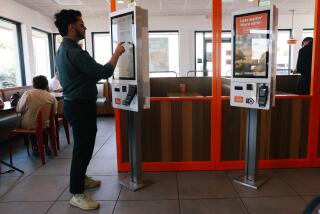When You Hear the Beep : Modern Tools of Communication May Signal the End of Human Conversation
- Share via
SOME TIME AGO a reader wrote that he was in a fast-food restaurant when it closed because the computer had broken down. None of the employees knew how to make change.
Whether that actually happened, I don’t know, but it is entirely possible. When you order a cheeseburger, a Diet Pepsi and fries, the counter person taps in the order on the computer, which not only sends the order directly to the kitchen but also makes the correct change, to the penny, and probably goes on to delete the items ordered from the inventory, so that the inventory is up to date at every second.
Of course this technology makes the transaction faster, so why should the customer complain? Nevertheless, something is lost. There is no time for human contact. The counter person hardly has time to say, “Have a nice day.”
He or she has had to make no calculations, has had to make no conversation. Like the customer, the counter person has become merely a function of the computers. In time, like the computer, he or she will be unable to laugh or cry. Whether computers can actually think remains to be seen.
Now, I read, it has gone a step further. Instead of being labeled “CHEESEBURGER,” the proper key has a picture of a cheeseburger, making it absolutely unnecessary for the counter person to know how to read. That is merely the penultimate step. No doubt soon the customer will be asked to speak his or her order into a microphone, and the computer will translate the sound. The counter person’s only function then will be to move the completed order from the cook to the customer.
If anything is said at all between customer and employee, it will be limited to “Thank you” and “Have a nice day.”
I suppose computers are used in such situations to save money. The fewer calculations the employee has to make, the less money he or she will have to be paid, and the more customers can be served during a given amount of time.
Harold Sriro, a dentist, summarizes his recent experience: “First, I was standing in line waiting for a clerk to ring up the sale on his megabyte computer, so that not only was the sale being recorded, but the entire store was probably being re-inventoried, a current profit-and-loss sheet updated and a cash-flow summary produced. All this while we stood around cooling our heels, wondering whatever happened to the ‘grease pencil on the side of the brown paper bag’ era. That technique was accurate and fast and, if nothing else, at least involved some continuous human mental and physical moves so that all concerned felt they were still a part of the transaction.”
There is no use wanting to go back to grease pencils and brown paper bags. The computer is here to stay. Strangely, though, in what is called the era of communication, communication is hand-led more and more by computers, and people are communicating less.
We last remodeled our house at a time when use of the telephone-answering machine was becoming widespread. Throughout the remodeling ordeal, my contractor and I communicated almost entirely by answering machine. He would call me and get my answering machine, and I would call him and get his answering machine. One afternoon we actually managed to meet in person in my living room, and we spent the entire afternoon drinking beer and becoming quite incompetent. I think we were caught up in the emotional effect of actually talking in person.
Of course, the last straw is the computerized telephone pitch, where some real estate company calls you and gives you a computerized message. They don’t even pay you the courtesy of spending a minute of human contact on you. I wouldn’t respond to one of those messages if they offered me a free trip to the Caribbean, no strings attached.
I have rather adapted to the fax machine my wife bought me for Christmas. At first I was angry with her. It seemed too much money to spend for something I would never use.
I must admit, though, that it has come in handy. Several times I have had The Times send me copies of articles I needed. I have received copies of documents I needed, thus saving two or three days’ mailing time. Once, though, I received an ad from a fax company. How did it know my number? If my number gets out, I’m in real trouble.
Then the other day I walked into my room to see about five yards of paper that had emerged from the machine and coiled in a mass on the floor. I scooped it up and scanned through it. It was a complete blank. Not a word. The little status window in the machine said “Paper empty.” My worst fears were realized. It was like hearing from a ghost.
Is this the age of communication or what?
More to Read
Inside the business of entertainment
The Wide Shot brings you news, analysis and insights on everything from streaming wars to production — and what it all means for the future.
You may occasionally receive promotional content from the Los Angeles Times.










